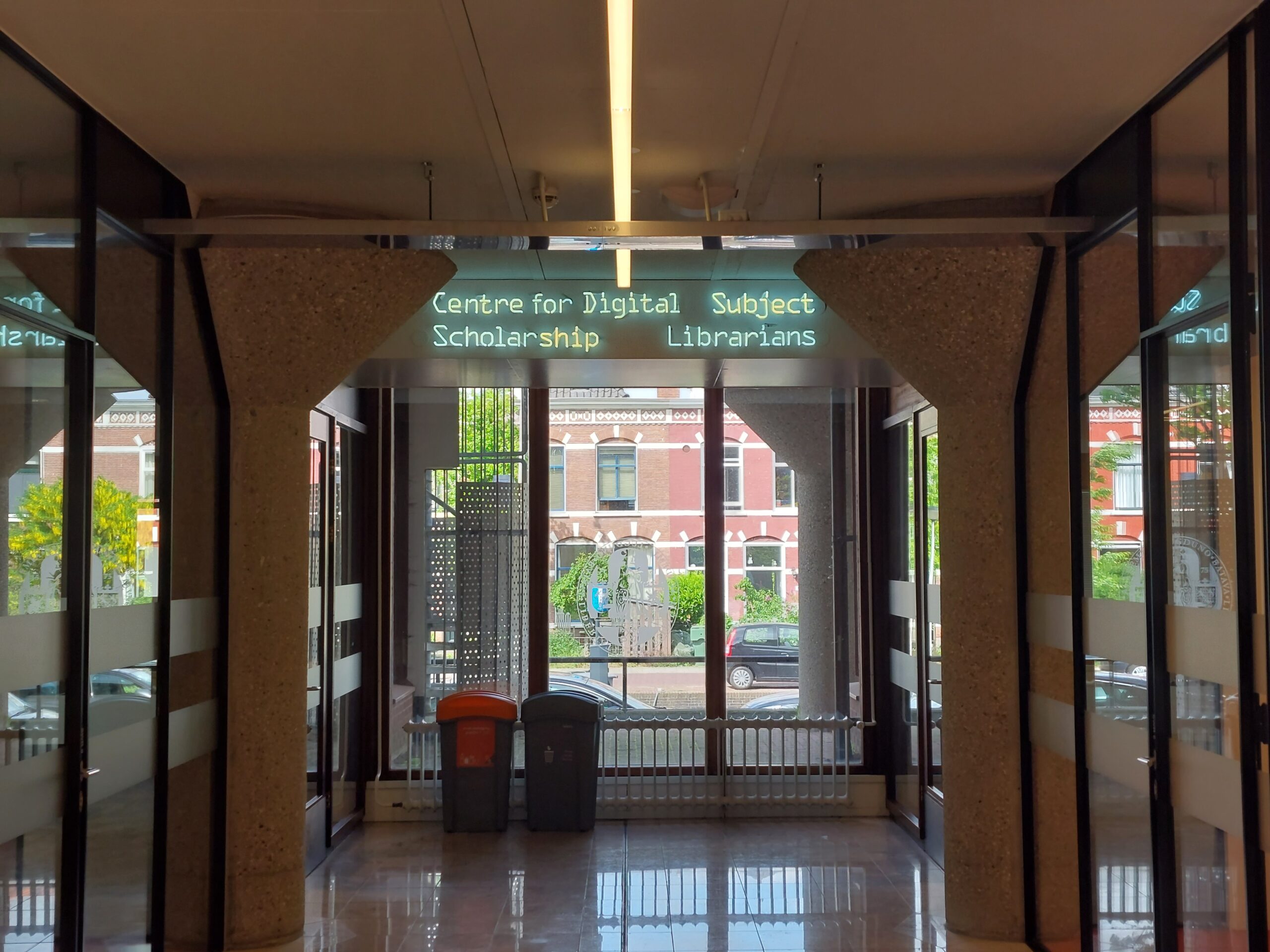Home University of Edinburgh Library Essentials
July 27, 2024
Copyright Insights and Collaborative Exploration: A Visit to Leiden University and KU Leuven Libraries
Posted on June 13, 2023 | in Library & University Collections | by estoicaLast month, I had the incredible opportunity to go on an Erasmus+ visit to Leiden University Library and KU Leuven University Library to meet with colleagues and discuss about copyright, the second publishing right as existent in the Netherlands & Belgium, Open Access and Plan S issues and, generally, about research support services that our libraries are offering academics.
Leiden University is one of the oldest and largest universities in the world. It was founded in 1575 and its library has a collection of over 7 million items, including books, journals, manuscripts, maps, and photographs.
“Leiden University Library, Centre for Digital Scholarship” by Eugen Stoica, The University of Edinburgh is licensed under CC BY 4.0
During my visit, I had the pleasure of engaging with colleagues from Centre for Digital Scholarship, especially with Erna Sattler (copyright librarian), and had very fruitful discussions about copyright research funding issues and requirements. I talked about Edinburgh’s Research Publication and Copyright policy and I learned how the Taverne amendment helped them make many of their publications available Open Access. I also had many interesting discussions with colleagues from CDS regarding the Library research support services that we offer to academics. These services cover research data management, research software, institutional repository, open access and scholarly communication, copyright, licensing and so on.
I was surprised to learn that at Leiden, library’s budget is formed from schools’ contributions and consequently when the library management are requesting an increase of their budget, they must justify it. The library will present (green) OA to schools as an alternative to traditional (expensive) academic publishing and as an option to reduce publishing costs, trying to motivate schools & researchers to adopt (green) OA. On the other hand, Edinburgh Library (which is funded from university central accounts) is the principal driver for pushing schools & researchers towards OA and being compliant with their research funders’ requirements.
KU Leuven will celebrate its 600th anniversary in 2025, making it one of Europe’s oldest universities. It has a very large and important academic library, with a collection of over 10 million items.
“KU Leuven University Library” by Eugen Stoica, The University of Edinburgh is licensed under CC BY 4.0
At Leuven, I had meetings with Hanne Heirman, Head of Policy Implementation, Library Central Services and Sara Decoster, Open Science Officer. The discussions were centred around the same topics – copyright research funding issues and requirements. Just like the Netherlands (and other five European countries), Belgium had a similar amendment introduced in the copyright legislation in 2018.
While these amendments to the copyright legislation are incredibly useful, allowing them to make public all research outputs publicly financed, in my view there are also a few disadvantages. Firstly, there is an embargo – 6 or 12 months from publication. Secondly, the benefits granted by the amendments come into force after publication, forcing libraries to concentrate all their attention and resources to dealing with works that were already published. Thirdly, researchers are not really motivated to make their research available OA, knowing that the library will do it anyway, based on the copyright amendments.
In the UK, REF2015 regulations required research outputs to be made available OA in order to be eligible for REF; this forced libraries, and indirectly researchers, to focus their attention towards the future, to make sure that they will publish their outputs in such a way that they will be eligible for REF. Also, research funders are requiring that all research they are supporting to be made available OA, usually under a CC BY license.
I was very impressed with the work that is being done at both Leiden University Library and KU Leuven University Library. I am grateful for the opportunity to have met with my colleagues and to have discussed these important issues.
I believe that the work that we do as copyright librarians is essential to the advancement of research. We help to ensure that authors are able to protect their intellectual property rights and that researchers have access to the scholarly literature that they need to do their work. I am delighted to see that we are all committed to continuing to work to promote Open Access and to ensure that research is available to everyone.
Collections
 Archival Provenance Project: Emily’s finds
My name is Emily, and I’m the second of the two archive interns that...
Archival Provenance Project: Emily’s finds
My name is Emily, and I’m the second of the two archive interns that...
 Archival Provenance Project: a glimpse into the university’s history through some of its oldest manuscripts
My name is Madeleine Reynolds, a fourth year PhD candidate in History of Art....
Archival Provenance Project: a glimpse into the university’s history through some of its oldest manuscripts
My name is Madeleine Reynolds, a fourth year PhD candidate in History of Art....
Projects
 Sustainable Exhibition Making: Recyclable Book Cradles
In this post, our Technician, Robyn Rogers, discusses the recyclable book cradles she has developed...
Sustainable Exhibition Making: Recyclable Book Cradles
In this post, our Technician, Robyn Rogers, discusses the recyclable book cradles she has developed...
 Giving Decorated Paper a Home … Rehousing Books and Paper Bindings
In the first post of this two part series, our Collection Care Technician, Robyn Rogers,...
Giving Decorated Paper a Home … Rehousing Books and Paper Bindings
In the first post of this two part series, our Collection Care Technician, Robyn Rogers,...


